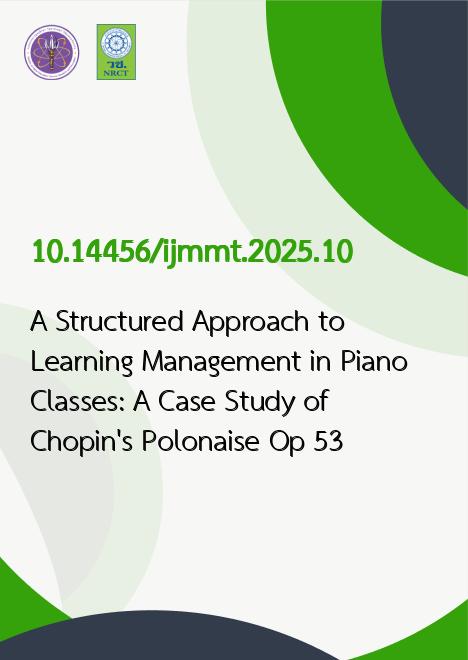
|
A Structured Approach to Learning Management in Piano Classes: A Case Study of Chopin’s Polonaise Op. 53 |
|---|---|
| รหัสดีโอไอ | |
| Creator | Zhu Yuanyi |
| Title | A Structured Approach to Learning Management in Piano Classes: A Case Study of Chopin’s Polonaise Op. 53 |
| Contributor | Sinam Klaywong |
| Publisher | Banndamnoen Press |
| Publication Year | 2568 |
| Journal Title | International Journal of Multidisciplinary in Management and Tourism |
| Journal Vol. | 9 |
| Journal No. | 1 |
| Page no. | 151-162 |
| Keyword | Polonaise, Learning Management, Piano Class |
| URL Website | https://so03.tci-thaijo.org/index.php/ijmmt |
| Website title | https://so03.tci-thaijo.org/index.php/ijmmt |
| ISSN | 2730-3306 |
| Abstract | This article aimed to study Learning Management in Piano Classes for Polonaise Music. The research sample consisted of three piano instructors from the Sichuan Conservatory and three second-year students from the Piano Department. Research tools included semi-structured academic interviews along with classroom observations. The study employed qualitative methods, with data collection focusing on both interviews and classroom observations. The findings revealed that The Polonaise in A-flat Major, Op. 53 (Heroic), composed by Chopin in 1842, is renowned for its grandeur, patriotism, and resilience. This piece follows a ternary form (A-B-A) with a 3/4 rhythm, expansive arpeggios, and sweeping octaves, symbolizing Poland's struggle for liberation. It serves as a powerful symbol of Polish nationalism. The learning management of The Polonaise in A-flat Major, Op. 53, which is structured in ternary form and set in a ¾ time signature, is effectively integrated into piano classroom instruction to enhance piano performance skills and cultural interpretation. The learning process emphasizes well-structured principles and lesson plans, incorporating lecture-based teaching, demonstrative methods, cooperative learning, and interactive sessions. The assessment focuses on four key components: Practical Performance (50%), Learning Management Achievement (30%), Positive Character Traits (10%), and Class Attendance (10%). This approach effectively develops students' technical skills, cultural appreciation, positive character traits, critical thinking, and musical interpretation, fostering well-rounded and comprehensive musical education |